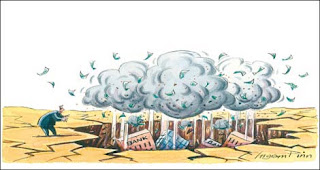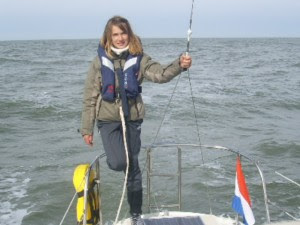
Today minus 5 years Theo van Gogh was slaughtered by a guy the media call Mohammed B. The guy practically butchered Theo and at his death turned him over on his belly and drew his knife into Theo's back, the knife carrying a message of hate and revenge.
Theo has a nice name, 'van Gogh', and his name always reminds me of an american college professorini (this time female) who, on her visit through the Paris Louvre, told her not too bright and/or culturally inclined college class, that HERE was a selfportait painted by the famous french impressionist van Gogh. In my world, you have to invent something utterly spectacular around the van Gogh name to surpass this unbelievable story. Theo's death created that invention.
Theo is dead, he has been dead for exactly five years now. Theo was a documentary maker, a film maker, a person with too much love for the things he hated and that meant his death by Muslim hands. Yes, by spitting out the cause of his murder and equating that to a certain religion is exactly what I mean. By Muslim hands. Not by someone who happens to come from Marocco, happened to own a very big knife and happened to cross Theo, as usual bycicling through Amsterdam thinking, yeahhh, maybe I feel like killing today. Theo was not friendly to Muslims, he was neither friendly to more or less any minority or majority group in the Netherlands. But neither of these other groups killed him. Only Mohammed B. felt the need to do so, and he did so, thinking that his namegiver Mohammed (the 1st) would have done the same...(which is probably true).
Which of course is stupid, preposterous, and dangerous but IMHO -again- true.
Five years later a dutch member of Parliament (House of representatives if Parliament is too complex a word for you) by the name of Geert Wilders has been scrutinized by a three-member set of (assumedly) academic professionals. Today the conclusion of their 'research' effort leaked to the press and it said this Geert W. is a threat to our democratic system. Geert is stated to be 'ultra-right wing' and is -on his own- responsible for creating hate to the dutch government.
In my opinion this screams for a counter-answer.
As everybody who is more or less well informed and house-broken in the world of the dutch old boys/girls network (and beyond) will know, there is noone in this group who does not hate government less than Geert. To be more specific, a simple survey of people who hate government's actions will either be readers of the biggest newspaper the Netherlands has (the 'Telegraaf') or is a member of the dutch 'liberal' party, the VVD, as it is named over here. Liberal is not to be translated in its US-equivalent, meaning leftish, but has to be seen in its dutch perspective meaning anti-government, market oriented, ultra conservative (a bit like the GOP in the US), or both (reread the sentence to understand these last two words).
Our country is in turmoil. Geert's market share now accounts for about 20% of the electorate public and of course the old parties see that % as threatening -which is correct- and impossible to cope with, as they demonstrate on a daily basis. Another 20%-ish party, the second dutch liberal party which is more or less equivalent to the US noun 'liberal', called D'66, has a spokesman/leader named Pechtold, who today called Geert W. a racist. Stupid of course because Geert W. does not preach racism, he preaches anti-Muslim-ism, or to be more specific, he regards the Muslim faith to be an ideology, more than a religion and he (Geert) equates this ideology as fascism, which of course he has every right to, especially because of course he is right.
The only difference between him and me is that every religion (Jewish/ Christian/ Hindu/ Muslim/ name a few others if you like) has this same flaw: they are all non-democratic, are all woman suppressors, gay orientation negative, have one strong leader be it a pope, a dalai lama or otherwise, have their own sacred books, rituals and the like, that tell a god-given (or inspired) truth, and as far as I'm concerned cannot cope with the dynamics of modern day life. In short: Geert is right in his battle, he is not right in thinking that only Muslims carry misconceptions (albeit that the Muslim belief is record holder in all disciplines named above).
Geert is an asshole. He truly believes that the Muslim belief is detrimental to democracy. He is right of course, BUT, he does not extend his ideas to other 'beliefs' who are at least as detrimental to your spiritual health. The thing is: other beliefs have seen the signs of the time and do not stress anymore their idiotic rules, written down in their idiotic sacred books. Nobody reads books anymore so the religious leaders can easily free themselves of criticism by 'forgetting' to openly speak about their own sacred rules. Muslims have proven to be not so smart. They still think that the words of a war-monger named Mohammed were true, a man who married and had sex with a 7-year old girl, a man who made his fortune by robbing his enemies (yeah sure 'enemies of the faith....'), an illiterate man who did not even read the Thora or the Bible, where these books in the 8th century were readily available, and made statements on the basis of the Thora/Bible which are utterly crazy, unfounded, misinterpreted, untrue and thus the antithesis of 'truth'. This man-of men is adored in the Muslim world although his sacred book either condemns or accepts other religions (depending on their 'suras' being written in Medina or in Mecca). Whose book is ordened using the lenght of the sura texts as ordening principle, where historic dates would have been a much better criterion.
The Christian faith has at least the same or more of the same flaws. Our Bible was 'created' in the 4th century. Between the beginning of the first century (CE) and the fourth, many 'inspired' men wrote gospels and the like. Some 300+ gospels are known, but only four of them survived the fourth century. The Nag Hammadi finds as well as the Dead Sea Scrolls gave us much more than the four gospels we know. Rent the movie 'Stigmata' and learn that there are more than the easy four that Beethoven and especially Bach knew. We now have the Thomas gospel, where it says:
....... Lift a stone and you will find me......
Which is soemething else than joining mass at Saint Peter's Church in Rome.
I leave y'all with these thoughts, which are neither true nor useless. If you want to believe that prayers may help, one last set of words by my hero writer: Maarten 't Hart. He once wrote the following:
"Accepting nature's laws, a prayer would take 9 years to reach the first possibly inhabited planet. The answer (by god) would take the same 9 years. For your prayer to be answered you'd better have at least an 18 year patience...."















